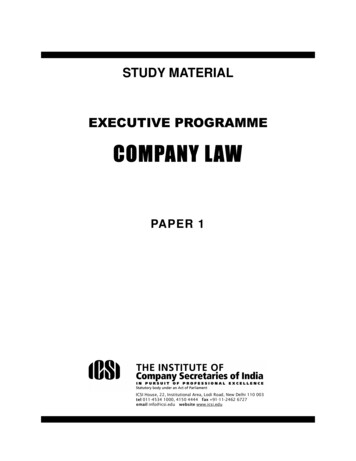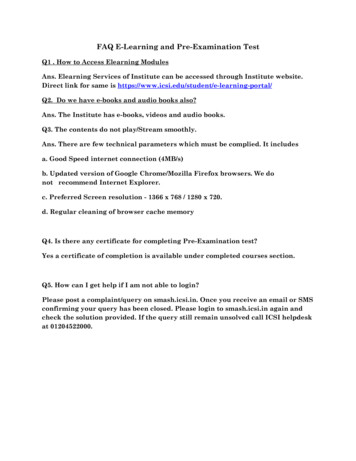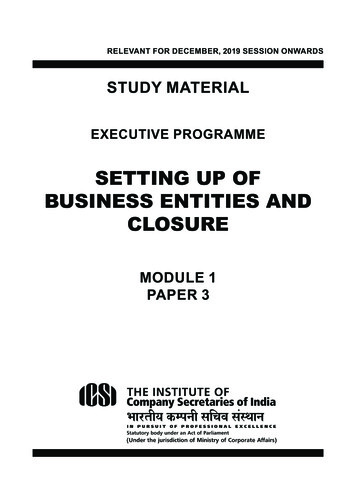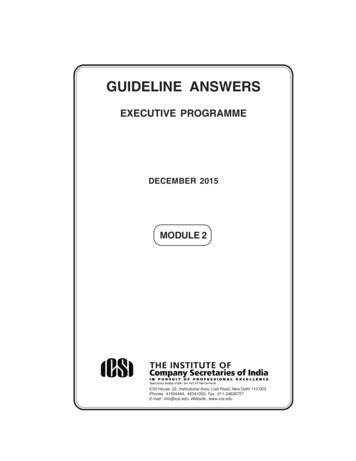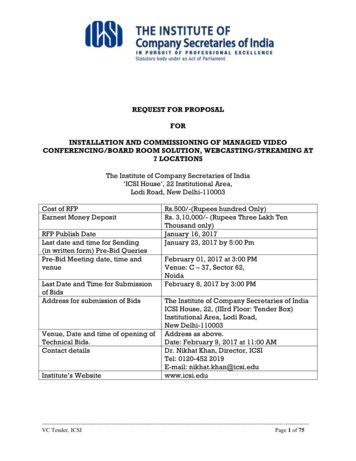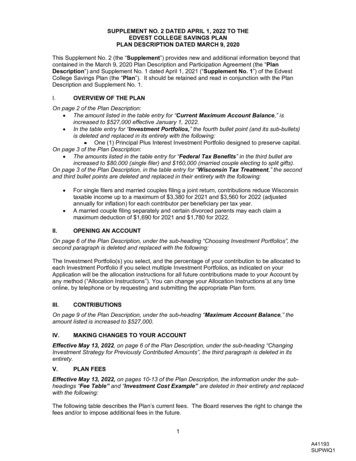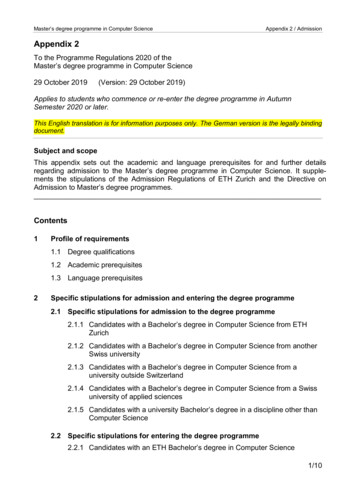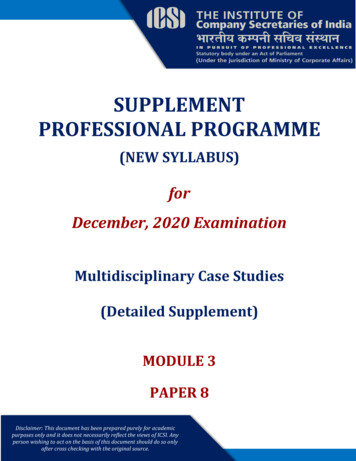
Transcription
SUPPLEMENTPROFESSIONAL PROGRAMME(NEW SYLLABUS)forDecember, 2020 ExaminationMultidisciplinary Case Studies(Detailed Supplement)MODULE 3PAPER 8Disclaimer: This document has been prepared purely for academicpurposes only and it does not necessarily reflect the views of ICSI. Anyperson wishing to act on the basis of this document should do so onlyafter cross checking with the original source.
Lesson No. and NameRemarks1.Corporate Laws including Company LawNew Case Laws/ Case Studies are added in simplified2.Securities Lawslanguage for better understanding to the students.3.FEMA and other Economic and BusinessLegislationsStudents may please note that since Multidisciplinary CaseStudies (MCS) is an open book examination paper, the4.Insolvency Law5.Competition Law6.Business Strategy and Managementorders/judgements (relating the syllabus for MCS) by7.Interpretation of Lawdifferent authorities/judiciaries including Supreme8.Governance IssuesCourt, High Court, NCLT, NCLAT, CCI, Income TaxCase laws/Studies in the study material are indicativeonly.Studentsauthorities etc.areexpectedtostudythe
Lesson 1Corporate Laws including Company Law1)20.12.2019Joint Commissioner of Income Tax(OSD), Circle (3)(3)-1, Mumbai(Appellant) vs. Reliance JioInfocommLtd.&Ors.(Respondents)AndIncome Tax Officer, Ward 3(3)-1,Mumbai (Appellant) vs. M/s.Reliance Jio Infratel Pvt. Ltd. &Ors. (Respondents)NCLATCompany Appeal (AT) Nos.113 & 114 of 2019Justice S. J.Mukhopadhaya,(Chairperson)Justice A.I.S. Cheema,Member (Judicial)Mr. Kanthi Narahari,Member (Technical)Mere fact that a Scheme of Compromise or Arrangement may result in reduction of taxliability does not furnish a basis for challenging the validity of the same.Brief facts of the case‘Reliance Jio Infocomm Limited’- Demerged/ Transferor Company (Petitioner CompanyNo.1), ‘Jio Digital Fibre Private Limited’- Resulting Company (Petitioner CompanyNo.2) and ‘Reliance Jio Infratel Private Limited’- Transferee Company (PetitionerCompany No. 3) moved joint petition under Sections 230-232 of the Companies Act, 2013,seeking sanction of the Composite Scheme of Arrangement amongst ‘Reliance Jio InfocommLimited’ and ‘Jio Digital Fibre Private Limited’ and ‘Reliance Jio Infratel Private Limited’and their respective shareholders and Creditors (“Composite Scheme of Arrangement”).The Petitioner Companies (Respondents herein) filed Company Application seekingdispensation of the meeting of Equity Shareholders of the Petitioner Company No.2 and thePetitioner Company No.3 by seeking directions to convene and hold meetings of SecuredCreditors (including Secured Debenture Holders), Unsecured Creditors (includingUnsecured Debenture Holders), Preference Shareholders and Equity Shareholders of thePetitioner Company No.1.By order dated 11th January, 2019, passed in Company Application, the National CompanyLaw Tribunal (“Tribunal” for short), Ahmedabad Bench, ordered dispensation of the meetingof the Equity Shareholders of the Petitioner Company No.2 and the Petitioner Company No.3,directing for holding and convening the meetings of the Secured Creditors (including SecuredDebenture holders), Unsecured Creditors (including Unsecured Debenture holders),Preference Shareholders and Equity Shareholders of the Petitioner Company No.1.Notices were directed to be issued on Regional Director, North Western Region, Registrarof Companies, concerned Income Tax Authority (in case of Petitioner Company No.1),‘Securities and Exchange Board of India’, ‘BSE Limited’ and ‘National Stock Exchange
of India Limited’ (in case of Petitioner Company No.1) stating that the representation, ifany, to be made by them, within a period of 30 days from the date of receipt. Publication wasalso directed to be made and published in the Newspaper in English language having all Indiacirculation and in Gujarati language having circulation in Ahmedabad. Statutory notice wasissued and Affidavits were also filed.The NCLT, Ahmedabad Bench, taking into consideration the Chairperson’s Report of themeeting of the Secured Creditors; Chairperson’s Report of the meeting of the UnsecuredCreditors; Chairperson’s Report of the meeting of the Preference Shareholders;Chairperson’s Report of the meeting of the Equity Shareholders of the Petitioner CompanyNo.1, by order dated 11.01 2019, directed the Regional Director, North Western Region tomake a representation under Section 230(5) of the Companies Act, 2013 and the Income TaxDepartment to file representation.The Joint Commissioner of Income Tax (OSD), Circle (3)(3)-1, Mumbai and the income TaxOfficer, Ward 3(3)-1, Mumbai have preferred these appeals.According to the Appellants, the Tribunal has not adjudicated upon the objections raisedby the Appellant- Income Tax Department at the threshold before granting any sanction tothe proposed composite scheme of arrangement. It was submitted that the Tribunal hasnot dealt with specific objection that conversion of preference shares by cancelling them andconverting them into loan, it would substantially reduce the profitability of DemergedCompany/ ‘Reliance Jio Infocomm Limited’ which would act as a tool to avoid and evadetaxes.The main thrust of the argument was that by scheme of arrangement, the transferorcompany has sought to convert the redeemable preference shares into loans i.e. conversionof equity into debt which is not only contrary to the well settled principles of company lawas well as Section 55 of the Companies Act, 2013 but also would reduce the profitability or thenet total income of the transferor company causing a huge loss of revenue to the Income TaxDepartment.According to the Appellants, the scheme seeks to do indirectly what it cannot do directly underthe law. By way of the composite scheme, there is an indirect release of assets by the demergedcompany to its shareholders which is used to avoid dividend distribution tax which wouldhave otherwise been attracted in light of Section 2(22) (a) of the Income Tax Act.Further, as per the law, dividend arising out of preference shares can only be paid by thecompany out of its accumulated profits. However, when preference shares are convertedinto loan, the shareholders turn into creditors of the company. There are two consequencesof such conversion of preference shares into loan. Firstly, the shareholders who are nowcreditors can seek payment of the loan irrespective of whether there are accumulated profitsor not and secondly, the company would be liable to pay interest on the loans to its creditors,which it otherwise would not have had to do to its shareholders. Payment of interest on suchhuge amounts of loan would lead to reducing the total income of the company in an artificialmanner which is not permissible in law.
IssuesWhether an assumption that the scheme of Compromise or arrangement may result inreduction of tax liability will furnish a basis for challenging the validity of the same?JudgementThe NCLAT, held that without going to the record and without placing any evidence orsubstantiating the allegation of avoidance of tax by appearing before the Tribunal, it wasnot open to the income tax department to hold that the composite scheme of arrangementamongst the petitioner companies and their respective shareholders and creditors is givingundue favour to the shareholders of the company and also the overall scheme of arrangementresults into tax avoidance. The NCLAT observed that mere fact that a scheme may result inreduction of tax liability does not furnish a basis for challenging the validity of the same.The Income Tax Department, which sought for liberty, while accepted by the PetitionerCompanies (Respondents herein) and the NCLT, Ahmedabad bench while approving theComposite Scheme of Arrangement has granted liberty. Such liberty to the Income TaxDepartment to enquire into the matter, if any part of the Composite Scheme of Arrangementamounts to tax avoidance or is against the provisions of the Income Tax and is to let it takeappropriate steps if so required.Thus, NCLAT upheld the decision of NCLT, Ahmedabad bench and in view of the libertygiven to the Income Tax Department decided not to interfere with the Scheme ofArrangement as approved by the Tribunal and dismissed the appeals filed.2)04.12.2019Registrar of Companies, Kerala(Appellant) vs. Ayoli Abdulla(Respondent)NCLATCompany Appeal (AT)No.145 of 2019Justice Jarat Kumar Jain,Member (Judicial)Mr. Balvinder SinghMember (Technical)Dr.Ashok Kumar MishraMember (Technical)NCLT per se has no power to waive the filing fee & additional fee.Fact of the caseThe Appeal has been preferred by Registrar of Companies, Kerala (‘for short ROC’) under Section421 of the Companies Act, 2013 R/w Section 248, 252 403 R/w Rule 12 of Companies(Registration Offices & Fees) Rules, 2014 and also Rule 87A(4)(d) NCLT Rules, 2016 by interalia seeking to set aside the order dated 07.03.2019 passed by NCLT, Chennai Bench, so far as it
relate to waival of additional fee in filing of balance sheet and Annual Return; to direct theRespondent to file all the pending statutory returns viz., Balance Sheets and Annual Returns withfiling fee and additional fee as envisaged under Section 403 of the Companies Act, 2013 etc.The Appellant i.e. Registrar of Companies, Kerala has preferred the Appeal and the Appellant hasno objection in restoring the name of the company as ordered by the said NCLT but the Appellantis aggrieved by waival of the additional fee in filing of the pending statutory returns of theCompany viz., Balance Sheets and Annual Returns. As per Section 403 (1) of the Companies Act,2013 it says that any documents required to be filed under the Act shall be filed within the timespecified in the relevant provisions on payment of such fee as may be prescribed and also providedfor payment of such additional fee which shall not be less than one hundred rupees per day anddifferent amounts may be prescribed for different classes of Companies. Rule 12 of Companies(Registration Offices & Fees) Rules, 2014 also states similarly.The Respondent Company was under the management dispute in the year 2011 onwards and thesame was settled before the NCLT Chennai Bench vide order dated 07.08.2017. The Respondentin the present case was reinstated as Managing Director of the Company as mentioned in the orderof NCLT Chennai Bench. The NCLT reinstated the Respondent as the Managing Director of theCompany and declared all documents filed on or after 27.04.2011 as null and void which includedthe Annual Financial Statements and Annual Returns for the Financial Years of the Company viz.2003-2004 to 2010-2011 filed on 7.10.2011 under the Company Law Settlement Scheme (invogue at the time).Issues:Whether NCLT has power to waive additional fees levied on defaulted statutory documents?JudgementThe NCLAT set aside the order passed by the NCLT, Chennai Bench to the extent of waival ofadditional fee for filing of Balance Sheet and Annual Return and held that NCLT per se has nopower to waive the filing fee & additional fee. The Registrar of Companies, Kerala is directed tocharge minimum additional fee. The Respondent is directed to file all the pending statutory returnsviz., Balance Sheet and Annual Return with filing fee and additional fee within a period of 30days from the date of receipt of this order and RoC, Kerala is directed to accept the same withminimum additional fee.3)04.12.2019RegionalDirector,Southern Region andOrs. (Appellants) vs.Real Image LLP andOrs. (Respondents)NCLATCompany Appeal (AT) No. 352 of 2018Justice Jarat Kumar Jain, Member(Judicial)Mr. Balvinder Singh,Member (Technical)Dr. Ashok Kumar Mishra,Member (Technical)If an Indian Limited Liability Partnership (‘LLP’) is proposed to be merged into an Indiancompany then firstly, the LLP has to apply for registration under Section 366 of the
Companies Act, 2013.Fact of the caseNational Company Law Tribunal, Chennai vide impugned order dated 11.06.2018 allowedthe company petition filed by respondents and permitted amalgamation of the LimitedLiability Partnership firm into Private Limited company. Hence the appellant RegionalDirector, Southern Region and Registrar of Companies have preferred this appeal underSection 421 of the Companies Act, 2013.M/s. Real Image LLP (hereinafter referred to as transferor LLP) with M/s. Qube CinemaTechnologies Pvt. Ltd. (hereinafter referred to as transferee company) and their respectivepartners, shareholders and creditors moved joint company petition under Section 230 to 232of the Companies Act, 2013 read with Companies (Compromises, Arrangements andAmalgamation) Rules 2016 and National Company Law Tribunal Rules, 2016 before NCLT,Chennai. Transferor LLP is proposed to be amalgamated and vested with transferee company.Transferor LLP is incorporated on 4.1.2016 under the provisions of Limited LiabilityPartnership Act, 2008 having its registered office in Chennai. The transferee company is aprivate limited company incorporated on 12.1.2017 under the Companies Act, 2013 andhaving its registered office also in Chennai. Both the incorporated bodies are engaged in thebusiness of establishing and or acquiring Audio and Video Laboratories for Recording, Rerecording, Mixing, Editing, Computer Graphics and special effects for Film, TelevisionVideo and Radio Productions etc.NCLT after considering the scheme found that all the statutory compliances have been madeunder Section 230 to 232 of the Companies Act, 2013 (in brief Act 2013). NCLT further foundthat as per Section 394(4)(b) of companies Act, 1956, LLP can be merged into company butthere is no such provision in the Companies Act, 2013. However, explanation of sub-section(2) of Section 234 of the Companies Act 2013 permits a foreign LLP to merge with an Indiancompany, then it would be wrong to presume that the Companies Act, 2013 prohibits of amerger of an Indian LLP with an Indian company.Thus, there does not appear any express legal bar to allow merger of an Indian LLP with anIndian company. Therefore, NCLT applying the principal of Casus Omissus, by the impugnedorder allowed the amalgamation of Transferor LLP with transferee company.Being aggrieved the appellants have filed the present appeal.IssuesIssue for consideration before NCLAT is that by applying the principal of casus omissus aIndian LLP incorporated under the LLP Act 2008 can be allowed to merge into an IndianCompany incorporated under the Act, 2013?Judgement:NCLAT observed that it is undisputed that transferor LLP is incorporated on 04.01.2016under the provisions of LLP Act, 2008 and the transferee company is incorporated on12.01.2017 under the Companies Act, 2013. Thus, these corporate bodies were governed by
the respective Acts and not by earlier Act, 1956. Hence, it is apparent that as per Section 232of the Companies Act, 2013, a company or companies can be merged or amalgamated intoanother company or companies. The Companies Act, 2013 has taken care of merger of LLPinto company. In this regard Section 366 of the Companies Act, 2013 provides that for thepurpose of Part I of Chapter XXI the word company includes any partnership firm, limitedliability partnership, cooperative society, society or any other business entity which can applyfor registration under this part. It means that under this part LLP will be treated as companyand it can apply for registration and once the LLP is registered as company then the companycan be merged in another company as per Section 232 of the Companies Act, 2013.NCLAT further observed that the provisions of the Companies Act, 2013 as a whole inreference of conversion of Indian LLP into Indian company there is no ambiguity or absurdityor anomalous results which could not have been intended by the legislature. The principal ofcasus omissus cannot be supplied by the Court except in the case of clear necessity and whenreason for it is found in the four corners of the statute itself. There is no such occasion to applythe principal of casus omissus.The legislature has enacted provision in the Companies Act, 2013 for conversion of IndianLLP into Indian Company and vice versa in the Limited Liability Partnership Act, 2008. Thusthere is no question infringement of any constitutional right of the Respondent.The NCLAT held that the impugned order passed by NCLT, Chennai Bench is not sustainablein law and thus, set aside, which is allowing the merger of an Indian LLP with an Indiancompany without such registration.Cassus Ommisus: a situation omitted from or not provided for by statute or regulation andtherefore governed by the common law.4)02.12.2019G. Vasudevan (Petitioner) vs.Union of India (Rep. bySecretary,MinistryofCorporateAffairsandMinistry of Law and Justice)(Respondents)Madras High CourtWrit Petition No. 32763of 2019and WMP. No. 33188 of2019Mr. A. P. Sahi(Chief Justice)Justice SubramoniumPrasadSection 167(1)(a) Companies Act not violative of Articles 14, and 19(1)(g) of theConstitution of India.Fact of the case:Petition filed under Article 226 of the Constitution of India praying for the issuance of a writ ofDeclaration, to declare the “Proviso” in Section 167(1)(a) of the Companies Act 2013, as
inserted vide the Companies (Amendment) Act 2017 as ultra vires the Articles 14, 19(1)(g)of the Constitution of India and declare illegal and null and void.The challenge in the instant writ petition is to the vires of the proviso to Section 167(1)(a) ofthe Companies Act, as inserted by the Companies (Amendment) Act 2017. The same isextracted hereunder: "(i) in clause (a), the following proviso shall be inserted, namely: — "Provided that where heincurs disqualification under sub-section (2) of section 164, the office of the director shallbecome vacant in all the companies, other than the company which is in default under that subsection."Section 167 of the Companies Act gives instances where the office of a Director shall becomevacant. Section 167(1)(a) states that if a Director incurs any disqualification specified inSection164, then he vacates his seat as a Director. The proviso which is under challenge inthe instant writ petition states that, when a company commits a default as stipulated in subsection 2 of Section 164, then a Director of such defaulting company does not vacate thepost in the company in which the default is committed but a Director of such a company hasto vacate his seat as a Director in all other companies in which he is Director.The petitioner contends that proviso to Section 167(1)(a) of the Companies Act, leads tounequal treatment being met out to Directors of a defaulting company based on whether theyare Directors in other companies or not. The petitioner claims that since this proviso statesthat such Directors of a defaulting company would only have to vacate Directorship in othercompanies while retaining the same in the defaulting company, this leads to unfair treatmentto those Directors who hold such posts in multiple companies.The petitioner further claims that this differential classification is not based on an intelligibledifferentia and that there is no justification provided for mandating the vacation of Directorshipin other companies, thus leading to this provision being arbitrary and violative of Article 14 ofthe Constitution of India. It is also contended that the impugned provision irrationally has adetrimental effect on other, non-defaulting companies and punishes individual Directors forthe defaults of a company even when fault cannot be directly attributed to them. The petitioneralso claims that the impugned proviso also violates the principles of natural justice.IssueThe primary issue in this case relates to whether or not the proviso to Section 167(1)(a) waswithout justification irrationally mandating the vacating of Directorship in other companieswhile not providing for the same in the defaulting company ?Judgement:The Madras High Court held that the proviso to Section 167(1)(a) must be interpreted inordinary terms and would apply to the entirety of Section 164 including sub-section 2. TheCourt has further held that this proviso can be justified on two grounds. Firstly, it has beenreiterated that the exclusion of Directors from vacating their posts in the defaulting companywhile doing so in all other companies where they hold Directorship has been done in order
to prevent the anomalous situation wherein the post of Director in a company remains vacantin perpetuity owing to automatic application of Section 167(1)(a) to all newly appointedDirectors. Secondly, the underlying object behind the proviso to Section 167(1)(a) is seen tobe the same as that of Section 164(2) both of which exist in the interest of transparency andprobity in governance, Owing to these justifications, the Court thus holds that the proviso toSection 167(1)(a) is neither manifestly arbitrary nor does it offend any of the fundamentalrights guaranteed under Part III of the Constitution of India. Thus, the writ petition isdismissed.5)04.11.2019 Mukut Pathak & Ors. vs. Unionof India & Anr.Delhi High CourtW.P. (C) 9088/2018 &CMAppln. No.35006/2018Justice Vibhu BakhruPenalty u/s 164(2) of Companies Act not to apply retrospectively.Fact of the Case:The petitioners were directors in various companies and were disqualified from beingappointed/ reappointed as directors for a period of five years u/s 164(2)(a), for default on thepart of their concerned companies, in filing of the annual returns and financial statements forthe financial year 2014-2016. The said list of directors, who were disqualified, was publishedin 2017. The petitioners challenged the list of disqualified directors, for defaults, pertaining tothe financial years 2012-2014 and 2013-2015 before the High Court.IssuesA. Whether the provisions of Section 164(2)(a) are retrospective?B. Whether a prior notice and an opportunity of being heard was required to be given beforepublishing the list of the disqualified directors?C. Whether the directors of a company are disqualified from being re-appointed as directors inother non-defaulting companies in which they were directors at the time of incurring thedisqualification?JudgementA. It was held that the provisions of Section 164(2) would apply prospectively and that it a wellsettled law, that no statute should be construed to apply retrospectively, unless such constructionappears clear from the language of the enactment or otherwise necessary by implication. It wasalso equally trite that a statute is not retrospective merely because it affects existing rights orbecause a part of the requisites for its action is drawn from a time antecedent to its passing.B. With respect to the second issue, it was noted that principles of natural justice are only meant
to supplement the law and are a kind of code of fair administrative procedure in the decisionmaking process.However, in the present case, the administrative authorities are not required to take anyqualitative decision, in as to when a director would be disqualified. Section 164(2) merely setsout the conditions, which if not complied with, would disqualify a person from beingreappointed or appointed as a director. Thus, it was unable to accept that exclusion of the “audialteram partem” rule resulted in any procedural unfairness.C. Lastly, Section 164(2) provides that no person who is or has been a director of company thathas defaulted u/s 164(2) shall be eligible to be re-appointed as a director of ‘that company’ orappointed in any ‘other company’.The expression ‘other company’ is used to refer to all companies other than the company whichhas committed the defaults as specified in clauses (a) and (b) of Section 164(2).It was also noted that the term appointment would include any ‘reappointment’ as well. Thus,it was held that the directors of the defaulting companies were not eligible to be appointed orreappointed as directors in any company for a period of five years. It is clarified that thepetitioners would continue to be liable to pay penalties as prescribed under the Act.6)24.10.2019Jindal Steel and PowerLimited (Appellant) vs.Arun Kumar Jagatramkaand Ors. (Respondents)NCLATCompany Appeal (AT)No. 221 of 2018Justice S.J. Mukhopadhaya(Chairperson)Justice Bansi Lal Bhat,Member (Judicial)During the Liquidation proceeding under Insolvency and Bankruptcy Code, 2016 apetition under Section 230 to 232 of the Companies Act, 2013 is maintainable.Fact of the caseGujarat NRE Coke Limited (‘Corporate Debtor’/ ‘Corporate Applicant’) moved anapplication under Section 7 of the I&B Code before the Adjudicating Authority (NCLT),Kolkata for initiation of ‘Corporate Insolvency Resolution Process’ on account of variousdefaults committed by it. It was admitted by the Adjudicating Authority on 7.04.2017 and‘Corporate Insolvency Resolution Process’ was initiated.In absence of any ‘Resolution Plan’, the Adjudicating Authority passed order of ‘Liquidation’on 11.01.2018 after the expiry of 270 days. First Respondent-Mr. Arun Kumar Jagatramka(Promoter) filed Appeal before NCLAT against the order of ‘Liquidation’ in Company Appeal(AT) (Insolvency) No.55-56 of 2018, challenging the ineligibility under Section 29A of theI&B Code as ‘Resolution Plan’ submitted by him was not accepted. NCLAT allowed the
liquidation proceeding to continue.In the meantime, 1st Respondent-Mr. Arun Kumar Jagatramka (Promoter) moved anapplication under Sections 230 to 232 of the Companies Act, 2013 before the NCLT, Kolkatafor Compromise and Arrangement between erstwhile Promoters and the Creditors. In the saidcase, the impugned order dated 15.05.2018 was passed.Jindal Steel and Power Limited (Appellant), an unsecured creditor of Gujarat NRE CokeLimited (‘Corporate Debtor’) has preferred this Appeal under Section 421 of the CompaniesAct, 2013 against order dated 15.05.2018 passed by NCLT, Kolkata Bench, which allowedthe application under Section 230 to 232 of the Companies Act, 2013, preferred by Promoter- Arun Kumar Jagatramka ordered for taking steps for Financial Scheme of Compromiseand Arrangement between Applicant - Arun Kumar Jagatramka (Promoter) and the Company(‘Corporate Debtor’) through the ‘Liquidator’, after holding the debts of shareholders,creditors etc., in terms of Section 230 of the Companies Act, 2013.IssuesThe Appellant has challenged the same on following grounds: (i)Whether in a liquidation proceeding under Insolvency and Bankruptcy Code, 2016the Scheme for Compromise and Arrangement can be made in terms of Sections 230to 232 of the Companies Act, 2013?(ii)If so permissible, whether the Promoter is eligible to file application for Compromiseand Arrangement, while he is ineligible under Section 29A of the Insolvency andBankruptcy Code, 2016 to submit a ‘Resolution Plan’?Judgement:The NCLAT observed that during the liquidation process, step required to be taken for itsrevival and continuance of the ‘Corporate Debtor’ by protecting the ‘Corporate Debtor’ fromits management and from a death by liquidation. During a Liquidation proceeding underInsolvency and Bankruptcy Code, 2016, a petition under Section 230 to 232 of the CompaniesAct, 2013 is maintainable.NCLAT further, stated that even during the period of Liquidation, for the purpose of Section230 to 232 of the Companies Act, 2013, the ‘Corporate Debtor’ is to be saved from its ownmanagement, meaning thereby the Promoters, who are ineligible under Section 29A ofInsolvency and Bankruptcy Code, 2016, are not entitled to file application for Compromiseand Arrangement in their favour under Section 230 to 232 of the Companies Act, 2013.Proviso to Section 35(f) of Insolvency and Bankruptcy Code, 2016 prohibits the Liquidator tosell the immovable and movable property or actionable claims of the ‘Corporate Debtor’ inLiquidation to any person who is not eligible to be a Resolution ApplicantFurther, Promoter, if ineligible under Section 29A of Insolvency and Bankruptcy Code, 2016cannot make an application for Compromise and Arrangement for taking back the immovable
and movable property or actionable claims of the ‘Corporate Debtor’.The NCLT by impugned order dated 15.05.2018, though ordered to proceed under Section 230to 232 of the Companies Act, failed to notice that such application was not maintainable at theinstance of 1st Respondent-Arun Kumar Jagatramka (Promoter), who was ineligible underSection 29A to be a ‘Resolution Applicant’.The NCLAT thus, set aside the order passed by the NCLT, Kolkata bench and remitted the caseto Liquidator/ Adjudicating Authority to proceed. Hence, the Appeal is allowed.7)19.09.2018M/sInd-SwiftLimited(Appellant) vs. Registrar ofCompanies(Punjab&Chandigarh) (Respondent)NCLATCompany Appeal (AT)No.52 - 53 of 2018Justice A.I.S.Cheema, Member(Judicial)Mr. Balvinder Singh,Member (Technical)Repayment of Deposits accepted before Commencement of the Companies Act,2013Fact of the caseAppellant is a Listed company, it had accepted deposits since 2002 and regularly paid back till28.02.2013. In 2013, it started facing liquidity problems and incurred losses. The Appellantcompany filed application before CLB and obtained relief under Section 58AA read withSection 58A (9) of the erstwhile Companies Act, 1956 and got instalments fixed to repaydeposits, Appellant again sought re-fixing of periods, instalments and rate of interest fromNCLT, New Delhi bench under Section 74 of the Companies Act, 2013. NCLT rejected theapplication. This appeal is against rejection of the application/s.Issues:Whether the Appellant company which has already got relaxation from CLB under Section58AA read with Section 58A (9) of the erstwhile Companies Act, 1956 and got instalmentsfixed to repay deposits, can again apply for re-fixing of periods, instalments and rate of interestfor repayment of deposits accepted before commencement of the Companies Act, 2013 ?Judgement:The NCLAT observed that the NCLT considered that the Appellant had at the time of first grantof time got relief of huge e
Companies (Respondents herein) and the NCLT, Ahmedabad bench while approving the Composite Scheme of Arrangement has granted liberty. Such liberty to the Income Tax Department to enquire into the matter, if any part of the Composite Scheme of Arrangement amounts to tax avoidance or is against the provisions of the Income Tax and is to let it take

